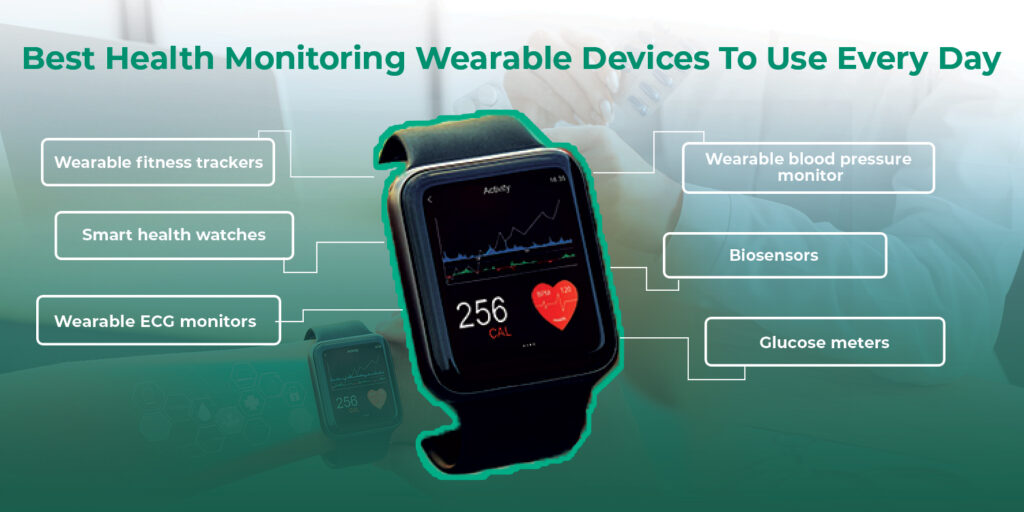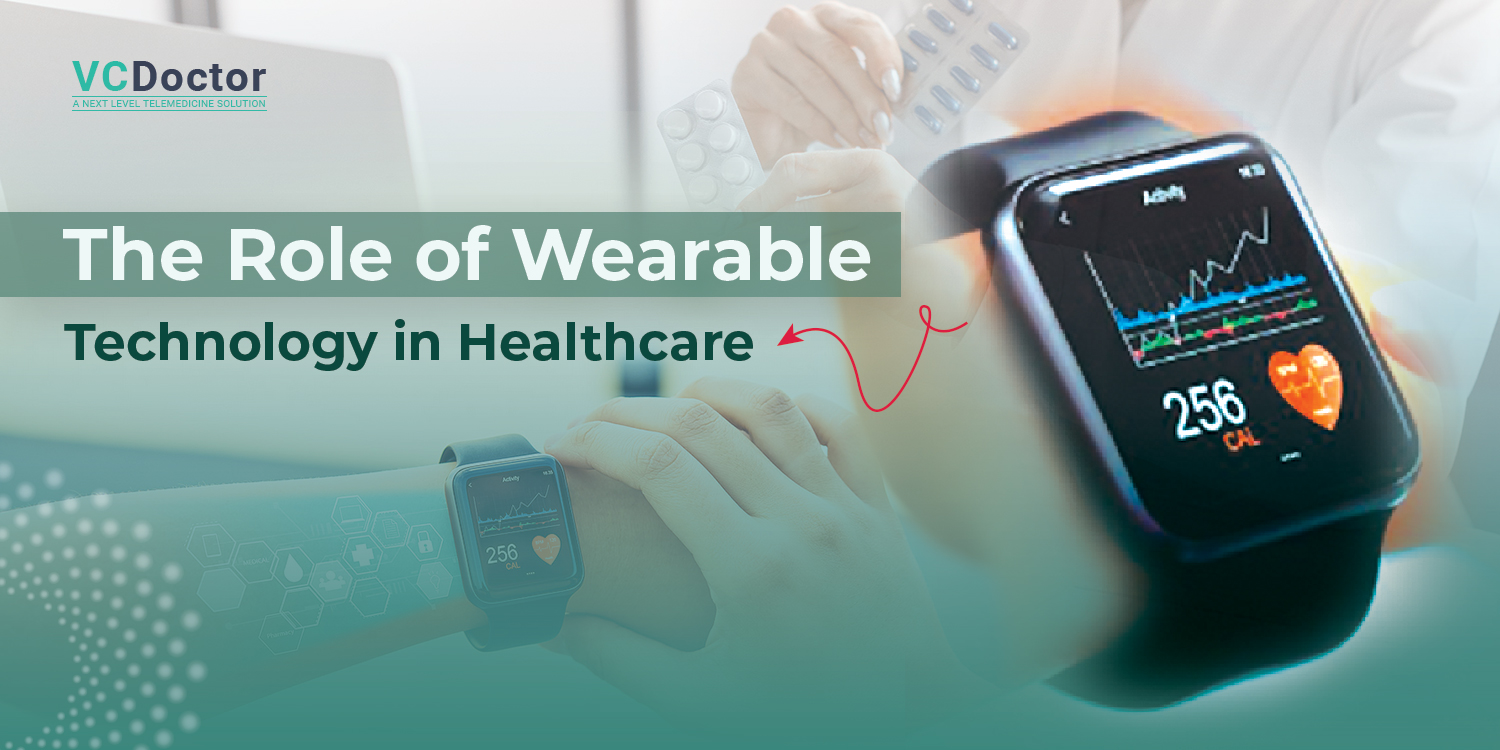The Role of Wearable Technology in Healthcare
Wearable devices have all the rage right now as they successfully link our senses to sensors, bridging the gap between humans and technology. Along with other industries, its use in the healthcare sector is quite prominent. According to a report by Deloitte Technology, the worldwide market of wearable technology for the medical industry is expected to reach nearly 440 million in 2024.
With the latest updates in biosensor technology, increased performance, and smaller-size equipment, wearable technology provide accurate medical information to patients. It allows patients to track, diagnose, and prevent any disease, adding more value to healthcare. If you are eager to know about wearable devices and healthcare, keep on reading. This article is a complete guide on wearable healthcare devices. Here we go!
Table of Contents
- Introduction To Wearable Health Technology
- Best Health Monitoring Wearable Technology To Use Every Day
- Pros And Cons Of Wearable Health Monitoring Devices
- Pros Of Wearable Health Monitoring Devices
- 1. Promote proactive healthcare
- 2. Boost patient engagement
- 3. Reduces healthcare cost
- 4. Reduces staff workload
- Cons Of Wearable Health Monitoring Devices
- 1. Technical problems
- 2. Data security and safety concerns
- 3. Improper device wearing
- 4. Data accuracy
- Future Of Wearable Technology And Healthcare
- How Can VCDoctor Help?
- Wrapping Up
- FAQs
Introduction To Wearable Health Technology
Wearable health technology refers to IoT solutions that combine software, hardware, and app development. In the healthcare industry, these devices are usually worn by patients on their wrists or hands to monitor patient’s health. Wearable technology rely on biosensors to collect all information from the patient, like their blood pressure, heart rate, activities, and sleeping patterns.
Since their inception, wearable health devices have gained a lot of popularity because of continuous advancements in sensory technology. Additionally, these batteries and sensors are extremely small. These gadgets are built with advanced sensors that accurately monitor fitness, general wellness, disease management, and heart rate. These can also store patient information and provide medication reminders.
Best Health Monitoring Wearable Technology To Use Every Day

1. Wearable fitness trackers
What is better than the traditional fitness trackers? These are the simplest and easy to use wearable devices in healthcare, offering patients an insight into their increasing pulse and heart rate. Additionally, this wearable fitness band keeps control of your physical activities along with tracking different sleep stages, total number of steps, and overall calories burnt.
2. Smart health watches
Smartwatches came into the limelight several years ago, and since then, they have been a center of attraction in the electronic device market. However, smart health watches are designed to provide valuable data related to your health only. Besides managing your messages and calls, these wearable technology smartwatches provide users an insight into stress levels, physical activities performed, or any heart abnormalities. Understanding the changing heart pattern abnormalities is only possible due to advances in optical sensors, semiconductors, and AI and data science technologies.
3. Wearable ECG monitors
According to a report, 37% of consumers in the US rely on wearable ECG monitors to track their heart health. As a result, the future of ECG monitors is believed to be extremely promising. It is a commonly used medical device empowered by wearable technology that provides end-to-end support to cardiovascular patient care. A wearable ECG device not only measures your heart health but also notifies you if there are abnormalities or defects. Further, this data can be shared with an expert to understand all the details.
4. Wearable blood pressure monitor
Hypertension is a commonly suffered health problem that people in their late 30s or 40s go through. Using a wearable blood pressure monitoring device gives you a clear opportunity to enhance screening for high blood pressure on a daily basis. In this way, you can promote wellness and improve healthcare delivery. Customers may now take their blood pressure in a more convenient method thanks to recent advancements in wearable technology. While research on this technique is still in its early stages, monitoring blood pressure without the use of a cuff improves patient satisfaction. It gives medical professionals more resources to address heart diseases.
5. Biosensors
Another most popular and latest health monitoring wearable technology, which is gaining immense popularity nowadays, is biosensors. These are small self-adhesive patches that promote sensor development along with AI-based analytics for the collection of important health information. Using biosensors, it becomes easier for health experts to measure variables such as respiratory rate, fluid volume, weight, and cardiac output. This prevents the chances of cardiac arrest or heart failure. In all, it is an excellent way to provide quality care to patients.
6. Glucose meters
It is well known virtual doctor software that cutting-edge blood glucose reading equipment is the greatest available for diabetes glucose monitoring. It offers a device that is worn on the upper arm and measures the reading from the device using a phone sensor. Since it may be worn for up to seven days at a time, this gadget is perfect since it reduces the need for patients to “prick” their fingers.
Pros And Cons Of Wearable Health Monitoring Devices
Pros Of Wearable Health Monitoring Devices
1. Promote proactive healthcare
Wearable technology makes it simple to keep a constant eye on health and identify any changes in vital indicators as soon as they occur. Consumers can avert major health problems in their early stages proactively. Clinicians can assist their patients in swiftly responding to signals and initiating treatment at the same time. Wearables improve patient-centricity and the delivery of healthcare in this way.
2. Boost patient engagement
People who wear these devices have access to a lot of valuable data that informs them about their overall health condition. The technology promotes a collective patient and doctor environment. Additionally, it allows patients to maintain overall health.
3. Reduces healthcare cost
Patients visit doctors less frequently because wearables reduce the risks of disease, improve early diagnosis, and encourage health. However, in order to prevent readmission fees and the loss of insurance coverage, healthcare practitioners might continue to keep an eye on their patients after they leave the hospital. In this sense, technology lowers the cost of medical care.
4. Reduces staff workload
Since wearable health devices automatically generate a huge amount of health data, these can be shared easily with your health expert to analyze patient reports successfully. This approach reduces personal visits, facilitates communications, and optimizes healthcare professional’s workload.
Cons Of Wearable Health Monitoring Devices
1. Technical problems
When it comes to technology, technical problems may arise anywhere and anytime. Portable health devices require way more power than any other device, which long-lasting batteries can provide. These batteries must support wireless charging to accommodate customer preferences. Thus, it’s high time that companies start to invest in improved semiconductor technology.
2. Data security and safety concerns
People who wear health monitoring devices are continuously worried about their private data being shared on multiple platforms. Since it is a major disadvantage of wearable devices. Companies are incorporating strict security standards to protect your personal information during its transfer and storage.
3. Improper device wearing
Wearing your wearable health monitoring devices rightly makes a huge difference in the readings. These devices must be placed at the right spot in direct contact with your skin. Above all, if you have tattoos or moisture on the skin, the results may not be accurate.
4. Data accuracy
When it comes to healthcare, your data needs to be 100% accurate! As a result, it should be transferred, processed, and generated efficiently. Thus, big data, AI, and IoT technologies applications come for help!
Future Of Wearable Technology And Healthcare
Wearable devices and the healthcare industry go together. With the latest advancements and improvements, consumers are relying on wearable medical devices that allow patients to get an overview of their health. Although there are several challenges of wearable health devices that developers need to address, wearable device development companies are overcoming these challenges. In all, the future of wearable devices is extremely fruitful!
How Can VCDoctor Help?
VCDoctor is a US-based telemedicine software development company that seamlessly integrates telemedicine solution for patients, allowing doctors to efficiently treat patients without any time and location constraint. Experts at VCDoctor keep patient-centric care and offer top-tier solutions for effective results. If you are looking to develop wearable medical devices, VCDoctor is here for your help! Get in touch with experts at VCDoctor now!

